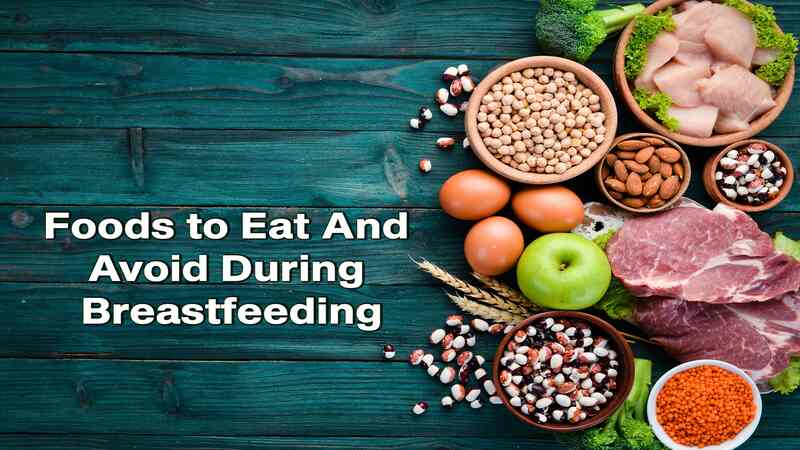
Breastfeeding is a beautiful and essential phase for the mother and the baby. Breast milk provides many of the vital nutrients that a growing baby needs. To ensure that breast milk has all the nutrition a baby needs, it is vital for the mother to have balanced nutrients that nourish and encourage the growth and development of the baby (1). The new mother should have a good knowledge of foods to eat and avoid when breastfeeding.
The food that the mother has influences the composition of the breastmilk as per a 2013 review article published in the journal Nutrients (2). The mother should include fresh and seasonal fruits and vegetables and whole grains in her diet while foods and habits that can interfere with the breastmilk production and the baby’s health must be completely avoided.
Video of Foods to Eat During Breastfeeding
Foods to Eat And Avoid During Breastfeeding
The craving for different foods will continue even after your delivery. You may feel hungrier than usual as you breastfeed your baby. Some doctors prescribe an additional 500 calories to your diet (3).
But, what you eat is more important. You have to be very careful in choosing your diet. Some yummy food might be a treat to your taste buds, but not your tummy and the little one’s body.
The more and more you are cautious about the nutrients, the more likely your little one will benefit. It is also important to understand what foods must be eaten, avoided, and what must not be unnecessarily restricted (4).
Here are some tips that you should consider before choosing your diet. Briefly, it guides on the food to eat and avoid during breastfeeding.
Dos of Diet When Breastfeeding
- Keeping yourself hydrated is vital. It would be best if you got hydration from water and food.
- If you are thirsty, grab a bottle and drink water. Do not postpone your thirst. Keeping a water bottle always accessible can help.
- Grab a fruit or low-fat dairy product when you feel hungry between meals or late at night.
- Make sure you follow a balanced diet.
- Don’t skip any of your prenatal vitamins.
Don’ts of Diet When Breastfeeding
- Make deliberate efforts to avoid processed foods, high in calories and high in sugar.
- Limit or avoid completely your caffeine intake. Caffeine can enter your breastmilk almost immediately after consumption (5)
- Avoid fish with high mercury content.
- Alcohol, cigarette, and drugs are to be avoided as they can affect your breastmilk and your baby’s future health (6)
[Read: Vitamin D For Breastfeeding Mothers]
Top 10 Fruits to Eat While Breastfeeding
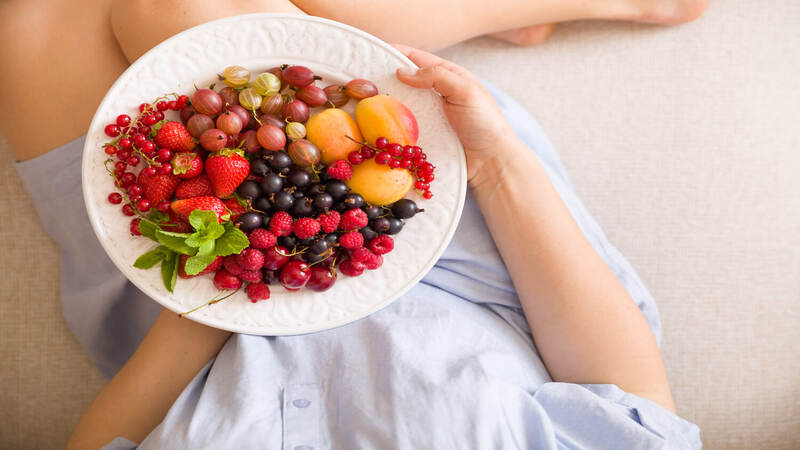
Fruits are our best friends during breastfeeding. But, sometimes we have to choose our friends. So, the following are the top ten fruits to eat while breastfeeding.
1. Avacado
During breastfeeding, consume fruits that enhance the level of milk production. Avacado is enriched with nutrients and helps lactating mothers maintain blood sugar and cholesterol levels. Avacado contains rich fatty acids, including omega 3, Omega 6, and Omega 9. The intake of vitamins and fatty acids influences the composition of breast milk (2A).
2. Papaya
Papaya is one of the best fruits to consume during breastfeeding (7). It contains potassium, a dietary fiber that helps mothers prevent heart disease and healthy bowel movements. Papaya is a low-calorie fruit and helps in weight management. It is widely known for its lactogenic effect and helps increase milk production in breastfeeding mothers.
3. Sapota
Breastfeeding may be tiring at times, especially during the initial days after delivery. Sapota acts as the best savior during the tiring days. It contains Vitamin A and Vitamin C, which helps to boost energy levels and immunity. It also contains magnesium, calcium, and phosphorous, which helps maintain strong bones and a healthy heart. Also, it gives a perfect cure for nausea and fatigue.
4. Bananas
Breastfeeding makes you shed the extra pounds that you gained during the pregnancy phase. Losing the extra pounds makes you tired. Bananas are rich in vitamins and minerals, which increase folic acid levels. Eating bananas during breastfeeding helps you to balance the calories that you shed during breastfeeding.
5. Green Papaya
Green papaya is a variety of yellow papaya which is unripe and induces lactation. It contains essential vitamins including A, B, C, and E that support lactating mothers. The green papaya pulp contains 88% water, 11% carbs, and a small portion of vitamin C. It is the best fruit to help you keep hydrated during breastfeeding (7A).
6. Figs
Sugar cravings are very common during breastfeeding. It is always best to consume natural sweeteners. Figs are the best source of natural sugars and help to satisfy your cravings at ease.
7. Mangoes
Can I eat mango while breastfeeding? This is the common question every mother asks herself. The answer is definitely yes. Consuming mango during breastfeeding is good. But, sometimes, it can cause allergies to the baby. So, it is advised to consume limited portions of mango.
8. Apricots
Apricots are lactation-friendly fruits. They are enriched with Vitamins A, C, K, and E, niacin, potassium, copper, manganese, and phosphorous. They help in controlling the activity of estrogen and also serve as a good source of fiber. These vitamins and chemicals help in regulating the lactating hormones in breastfeeding mothers.
9. Prunes
Prunes are popularly known as European plums – they are dried plums. It is rich in dietary fiber and prevents constipation. Prunes contain the mineral potassium. It helps to boost your nervous system. It also contains iron and boron which also help avoid anemia and to promote muscle health.
10. Cantaloupe
Cantaloupe is also commonly called musk melons and is a perfect breastfeeding partner. It keeps you hydrated and energetic during the breastfeeding journey. Even if you are the choosiest person about fruits, cantaloupe does not fail to impress your taste buds. Don’t forget to include them in your fruit bowl or snack.
[Read: Brewer’s Yeast When Breastfeeding]
Top 5 Vegetables To Eat During Breastfeeding
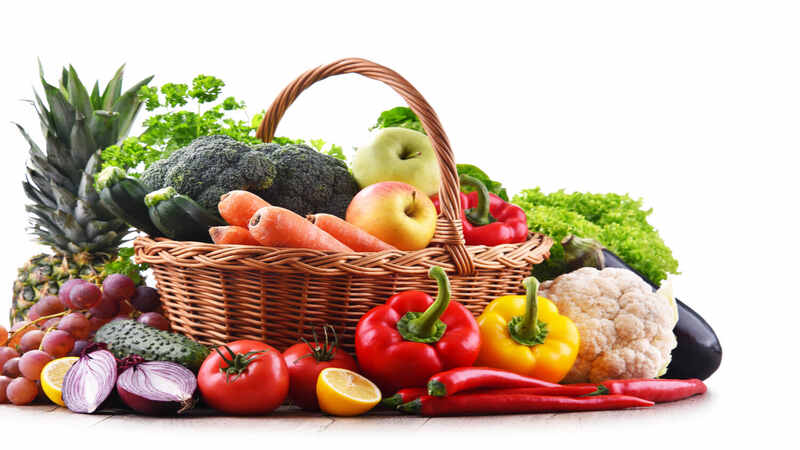
Choosing the right vegetable is very important. The food that we eat determines the major nutrients that we consume (8). The following are the best vegetables that you must consider so that you can judge which food to eat and avoid during breastfeeding.
1. Carrots
Carrots are bundled with a bunch of lactation-enhancing qualities. It contains high levels of Vitamin A. Vitamin A helps lactating mothers promote lactation and improve milk quality. They also contain phytoestrogens and beta-carotene. It also helps in keeping up the energy levels.
2. Sweet Potatoes
Sweet potatoes are a major source of Vitamin A, Potassium, and carotenoids. Vitamin A is very important for the newborn. It is a nutrient that enhances the vision, growth, reproductivity, and immunity of the baby (9). The babies depend completely on the breastfeeding mothers for the vitamins. Eating one medium-sized sweet potato meets the daily recommended vitamin A requirement of breastfeeding mothers.
3. Pumpkin
Pumpkin is one of the best vegetables to eat during breastfeeding. It is enriched with beta-carotene, Vitamin C, and fiber. The fiber helps you keep hydrated and prevents constipation. Vitamin C helps in the quick healing of the internal wound and helps in boosting the immunity system.
4. Tomatoes
Tomatoes are fruit. But, they are used much alongside all the vegetables. So, they are classified as vegetables. Tomatoes contain 94.5% of water (10). You will be amazed at the balance of 5.5% of nutritional components -Vitamin A, Vitamin C, folic acid, and antioxidants, including alpha-lipoic acid, beta-carotene, choline, lycopene, and lutein. It is bundled with healthy nutrients to aid breastfeeding mothers.
5. Spinach
Traditionally, green and leafy vegetables are said to increase the milk supply of lactating mothers (11) Spinach contains folic acid, and high levels of vitamins, minerals, and phytoestrogens. It is also enriched with potassium, calcium, and thiamin.
Vitamin B6 found in spinach plays a major role in milk production. It is also a strong healer for anemic mothers. It helps to enhance the health of the baby.
[Read: Eating Jackfruit While Breastfeeding]
Grains Offer Rich Nutrients
Grains are the best choice to make a healthier diet during breastfeeding. Whole grains contain a lot of fiber, which helps you keep fuller for a longer time, have your blood sugar levels under control, and drive you away from the common problem of constipation (12).
Whole grains are also completely complex carbohydrates. Complex carbohydrates make you feel fuller for a longer period. You will not feel energy dips as you might feel in refined carbs. They are also considered to be an important source of Vitamin B and minerals. Don’t forget to include the following whole grains in your diet.
- Bread
- Brown Rice
- Pasta
- Oatmeal
[Read: Millets For Post-Delivery and Breastfeeding Mothers]
Top 5 Good Sources of Protein While Breastfeeding
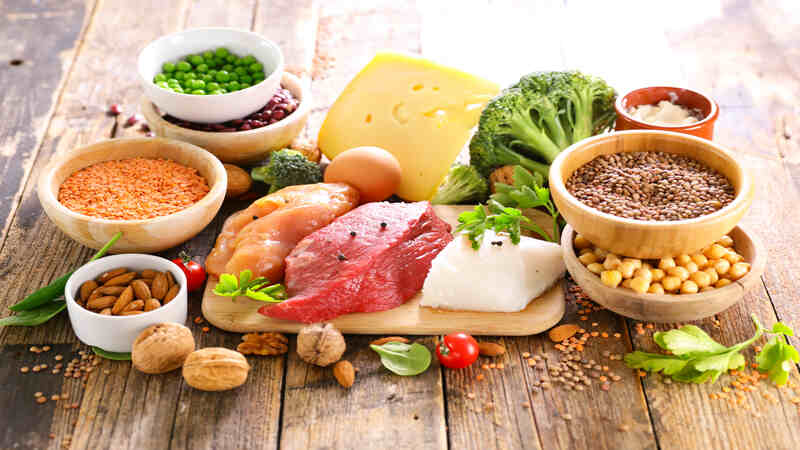
Proteins are important nutrients for breastfeeding mothers. They help boost milk production. The proteins also get passed on to the babies to have healthy growth.
The following are considered to be a good source of protein for breastfeeding mothers.
1. Lean Meat
Lean Meat such as Salmon or sardines is rich in DHA and omega-3 fatty acids. They help in maintaining the hormone balances and increase the breast milk supply. They also help reduce inflammation during the
recovery from delivery.
2. Eggs
Eggs are enriched with protein and choline, lutein, vitamin B12, Vitamin D, riboflavin, and folate. They are easily available and can provide quick and healthy snacking options.
3. Beans and Lentils
Beans and lentils are rich sources of proteins, fiber, micronutrients, and certain phytochemicals. Nursing mothers are recommended to include these protein-rich foods in their daily diet.
4. Tofu
Tofu, commonly known as soybean curd, is rich in protein. It also contains abundant magnesium, calcium, vitamin E, Iron, and minerals. Tofu has a low-calorie value, zero cholesterol, and good-quality protein that is free from gluten. It has lactose content which helps the lactating mothers in increasing the milk supply.
5. Nuts And Seeds
Nuts and seeds are the highest protein, fiber, vitamins, minerals, antioxidants, and fat. They help rejuvenate your skin and give it a healthy glow. Almonds are rich in protein and are considered to be the best source of non-dairy calcium. You can include various seeds in your diet such as pumpkin seeds, fenugreek seeds, and sesame seeds. They are rich in fiber, iron, and magnesium and packed with proteins to help boost breast milk production and improve energy levels for new mothers.
Dairy Products: Much Needed Source of Calcium and Vitamins During Breastfeeding
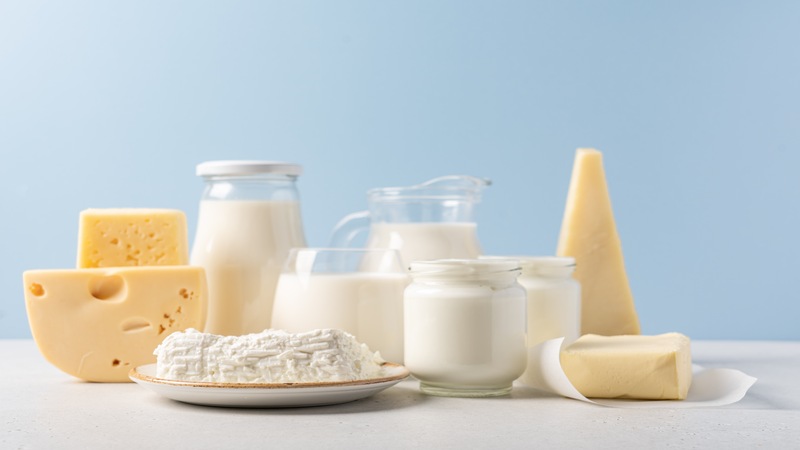
Having healthy bones is necessary before, during, and after pregnancy, especially during breastfeeding. A balanced diet with adequate calcium is required both for the mother and the baby.
During breastfeeding, the body’s requirement for calcium is greater (13). This is because both the mother and the baby consume the available calcium—the low–fat dairy products including milk, yogurt, cheese, and ice cream.
However, it is important to note that, sometimes, the dairy products might cause colic in babies (14). So, if you find any discomfort in babies, consult your doctor who will tell you what food to eat during breastfeeding to ensure proper calcium intake.
[Read: 12 Foods That Can Cause Colic in Breastfed Babies]
Can Some Foods Increase Breastmilk?

The most common question asked by mothers is – Is my baby getting enough milk? If you have a low milk supply, apart from the fruits and vegetables mentioned above, you can also include certain foods that increase breast milk supply in your diet. These foods are also known as galactagogue foods (15).
This list captures the important food you should eat while breastfeeding.
- Fennel Seeds
- Garlic
- Cumin seeds
- Fenugreek seeds
- Basil
- Barley
- Asparagus
- Bitter Gourd
- Dill Seeds
- Milk
- Chickpea
- Beets
- Watermelon
- Green tea
- Curry leaves
- Grapefruit
Video of Foods to Avoid While Breastfeeding
Top 10 Foods to Avoid While Breastfeeding
Ever wondered why so many breastfeeding mothers avoid specific foods? Just like you look after what to eat, you must also know what not to eat during breastfeeding. Try to avoid the following foods when breastfeeding to lessen your baby’s uneasiness and fussiness.
| SNo | Nutrients | Value |
|---|---|---|
| 1 | Alcohol | Breastfeeding mothers should completely avoid alcohol because it may decrease milk production and affect their infant’s health. Stay alcohol-free for safety. |
| 2 | Caffeine Foods | Limit caffeine use during breastfeeding to less than 300 mg per day to minimize infant irritability and sleep disruption. Coffee, chocolate, tea, and cola drinks all have caffeine. |
| 3 | High Mercury Fish | Breastfeeding mothers should avoid high-mercury fish such as swordfish and big-eye tuna to prevent their babies from mercury exposure. |
| 4 | Peppermint, Parsley, and Sage | Avoid overconsumption of flavorful herbs, because it may reduce the supply of breastmilk for your infant. |
| 5 | Spicy Foods | Breastfeeding mothers should limit their intake of spicy foods to ease their baby’s gas, colic, and diarrhea. |
| 6 | Peanuts, Eggs and Nuts | Avoiding allergens while breastfeeding can help prevent newborn allergies and mothers with allergies should avoid trigger foods. |
| 7 | Dairy Products – if your Baby has an Allergic Reaction | Many babies have a cow’s milk protein allergy. Avoid milk, milk products, casein, whey, and sodium caseinate if your baby is affected. |
| 8 | Processed or Junk Foods | Breastfeeding moms avoid processed/junk foods high in added sugars/fats, impacting their babies’ future eating habits. Stay mindful of your baby’s healthy development. |
| 9 | Legumes | Avoid beans and legumes while breastfeeding to prevent gas. Reintroduce gradually once the baby’s digestion matures to avoid discomfort. |
| 10 | Cruciferous Vegetables such as Cabbage, Broccoli, Cauliflower, and Turnips | Bloating, burping, and passing gas are normal after eating these gassy foods. And if your baby is also gassy or colicky, avoid these foods to relieve their symptoms. |
Cooking veggies eliminates bacteria and chemicals that can pass through breast milk, ensuring safer nourishment for your baby.
Avoiding the above foods while breastfeeding allows mothers to lessen their baby’s gas, colic discomfort, and restless crying, ensuring a happier, healthier infant. Monitor the baby’s reaction to your meals and make adjustments as needed to ensure that both mother and infant thrive while breastfeeding.
This list captures mostly all the foods that you should avoid during breastfeeding, but it’s always better to consult your doctor for your diet-related issues.
[Read: Can I Eat Chocolates When Breastfeeding?]
What to Eat While Breastfeeding to Increase Baby’s Weight
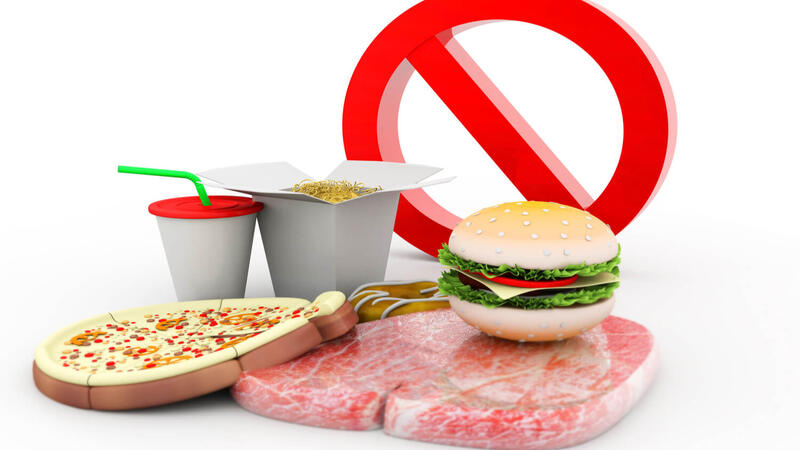
A well-balanced, nutrient-dense diet is essential for successful breastfeeding. Focus on essential fats, vitamins A, B, and C, as well as minerals like zinc, iodine, iron, and calcium. Meeting these needs ensures your health and nutrient supply when breastfeeding.
The greater variety of nutrient-dense foods you eat, the more you stimulate healthy infant weight gain.
Common Myths About Breastfeeding Diets
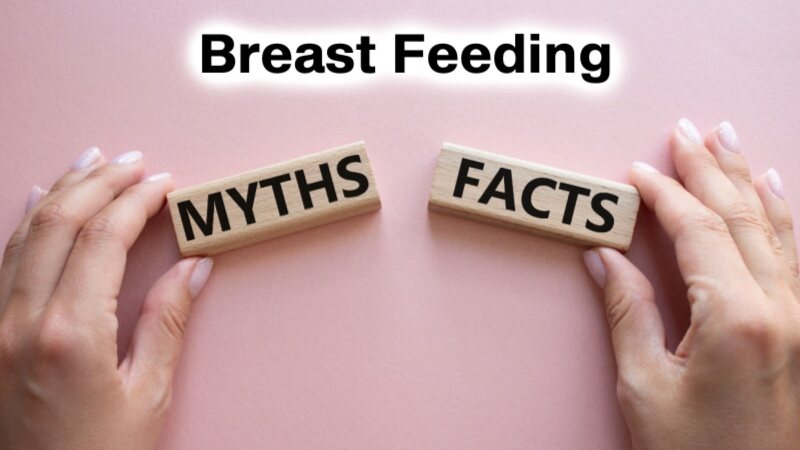
Here are some common myths associated with breastfeeding diets.
| Myth | Fact |
|---|---|
| Colostrum is unsafe for babies | Colostrum is a lifesaver and vital for babies |
| Drinking more milk improves breastmilk supply | Milk consumption is not related to breast milk production |
| Anise in mother’s diet helps baby colic | Anise does not have a role to play in baby colic |
Myth: Colostrum is stale and unsafe for babies.
Fact: Colostrum, or “first golden milk,” increases immunity and promotes long-term newborn health. Colostrum is beneficial to your baby’s well-being.
Myth: Drinking more milk increases breast milk supply.
Fact: Drinking more milk does not stimulate breast milk production. Instead, regular nursing increases milk production in response to demand.
Myth: Anise helps newborns’ stomachs and better sleep.
Fact: Normal newborn colic is common. To avoid infant illness, completely avoid any liquids and foods for the baby before 6 months.
Foods That May Cause Allergies in Breastfed Babies
Consider your family’s allergy history while planning your diet during breastfeeding. Avoid known allergens to safeguard your baby’s health. Dairy is one of the most prevalent food allergies in breastfed babies (16). The other most frequent allergies are peanuts, tree nuts, wheat, soy, eggs, fish, and shellfish (17).
Importance of Hydration During Breastfeeding

Maintain a nutrient-rich diet and stay hydrated, to support yourself and your baby effectively (18). Aim to drink 1.5-2 liters every day. Trust your thirst and consume fluids like milk, juice, soup, or simple water. Drink additional water if your urine is dark yellow.
Breastfeeding is a phase where mothers have to be very careful about what they eat. The fortune or misfortune is not only for the mother but also for the newborn. We have given you an insight into the food to eat and avoid during breastfeeding. Choose wisely and have happy breastfeeding. To maintain a healthy diet during breastfeeding, restrict your intake of unhealthy processed foods and beverages.
Infographics
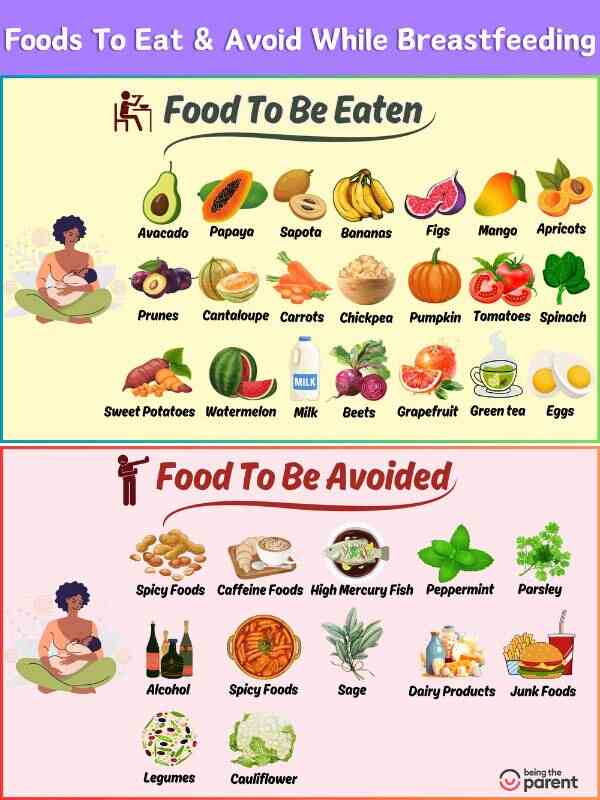
FAQ’s
1. What Fruits Create Gas in Breastfed Babies?
Gas in breastfed babies might be caused by fiber-rich fruits, including apricots, prunes, peaches, pears, plums, and citrus fruits.
2. What are the Vegetables I Should Avoid While Breastfeeding?
It is a good idea to avoid cruciferous vegetables such as cabbage, Cauliflower, and brussel sprouts since they may cause gas, indigestion and colic in babies.
3. What Food Causes Colic in Breastfed Babies?
Colic can happen when the mother includes foods such as cabbage, cauliflower, broccoli, chocolate, onion, milk and caffeine in her diet. If you baby is struggling with colic, limited or avoiding these foods may help relieve your baby from the symptoms.
References
- Dietary Patterns of Breastfeeding Mothers and Human Milk Composition: Data from the Italian MEDIDIET Study – PMC – [https://www.ncbi.nlm.nih.gov/pmc/articles/PMC8160768/]
- The Role of Avocados in Maternal Diets during the Periconceptional Period, Pregnancy, and Lactation – PMC – [https://www.ncbi.nlm.nih.gov/pmc/articles/PMC4882725/]
- Lactating Women | Directorate Medical and Health Service, Dadra and Nagar Haveli-Silvassa, India – [http://vbch.dnh.nic.in/content/lactating-women]
- Maternal food restrictions during breastfeeding – PMC – [https://www.ncbi.nlm.nih.gov/pmc/articles/PMC5383635/]
- Caffeine – Drugs and Lactation Database (LactMed®) – NCBI Bookshelf [https://www.ncbi.nlm.nih.gov/books/NBK501467/]
- Drinking or Smoking While Breastfeeding and Later Cognition in Children | Pediatrics | American Academy of Pediatrics – [https://publications.aap.org/pediatrics/article-abstract/142/2/e20174266/37569/Drinking-or-Smoking-While-Breastfeeding-and-Later?autologincheck=redirected]
- Impact of Papaya (Carica papaya L.) on Breast Milk Production Enhancement of Nursing Mothers at Teling Atas Public Health Center, Wanea Subdistrict, Manado City | Open Access Macedonian Journal of Medical Sciences – [https://oamjms.eu/index.php/mjms/article/view/5880]
- Maternal diet during lactation and breast-feeding practices have synergistic association with child diet at 6 years – PMC – [https://www.ncbi.nlm.nih.gov/pmc/articles/PMC6952591/]
- Vitamin A Requirements in Pregnancy and Lactation – PMC – [https://www.ncbi.nlm.nih.gov/pmc/articles/PMC7513584/]
- Responses of water accumulation and solute metabolism in tomato fruit to water scarcity and implications for main fruit quality variables – PMC – [https://www.ncbi.nlm.nih.gov/pmc/articles/PMC7242001/]
- THE IMPACT OF CONSUMING AMARANTHUS SPINOSUS L EXTRACT ON PROLACTIN LEVEL AND BREAST MILK PRODUCTION IN POSTPARTUM MOTHERS – [https://www.researchgate.net/publication/331215529_THE_IMPACT_OF_CONSUMING_AMARANTHUS_SPINOSUS_L_EXTRACT_ON_PROLACTIN_LEVEL_AND_BREAST_MILK_PRODUCTION_IN_POSTPARTUM_MOTHERS]
- Effects of rice-based and wheat-based diets on bowel movements in young Korean women with functional constipation | European Journal of Clinical Nutrition – [https://www.nature.com/articles/s41430-020-0636-1]
- Bone changes after 3 mo of lactation: influence of calcium intake, breast-milk output, and vitamin D-receptor genotype – ScienceDirect – [https://www.sciencedirect.com/science/article/pii/S0002916523182633]
- Cow’s Milk Whey Protein Elicits Symptoms of Infantile Colic in Colicky Formula-Fed Infants: A Double-Blind Crossover Study | Pediatrics | American Academy of Pediatricshttps://publications.aap.org/pediatrics/article-abstract/83/2/262/55226/Cow-s-Milk-Whey-Protein-Elicits-Symptoms-of” target=”_blank” rel=”noopener
- Selection and Use of Galactogogues – Frank J. Nice, 2015 – [https://journals.sagepub.com/doi/full/10.1177/1941406415579718]
- Micronutrients in infants suffering from cow’s milk allergy fed with dietary formulas and breast milk | BMC Pediatrics – [https://bmcpediatr.biomedcentral.com/articles/10.1186/s12887-024-04591-8]
- Food Allergies in Children | Johns Hopkins Medicine – [https://www.hopkinsmedicine.org/health/conditions-and-diseases/food-allergies-in-children]
- An Eating Guide for Breastfeeding Mothers – [https://hpb.gov.sg/newsroom/article/an-eating-guide-for-breastfeeding-mothers]
[Read Also: Boosting Immunity While Breastfeeding]
